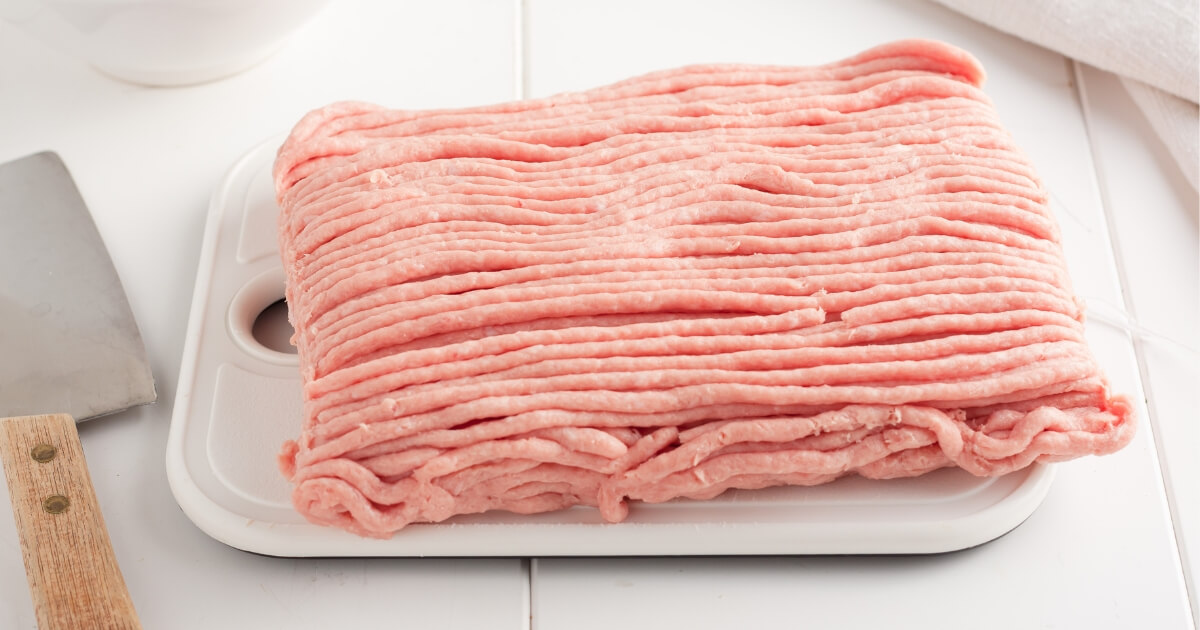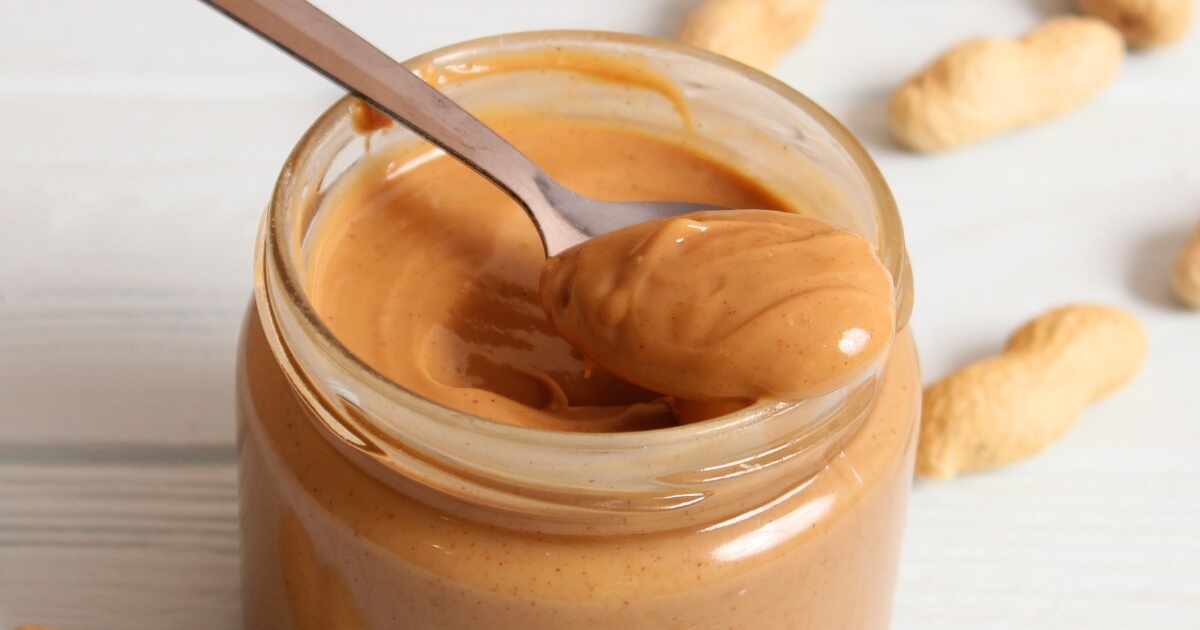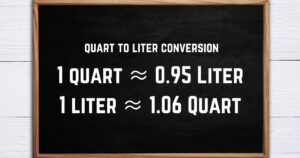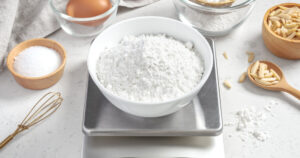Cheese is a glorious dairy delight that comes in many different types and flavors. It’s diverse and delicious, and I love trying new cheeses!
Some cheeses melt beautifully, making them ideal for sauces or grilled cheese sandwiches. Others hold their shape, adding a delightful bite to salads or appetizers. They can also differ in fat content, aging process, and even the type of milk used.

I think knowing your way around different types of cheese can take your home-cooked meals or midnight snacks to the next level. So grab your cheese knife and a handful of crackers because we’re about to get cheesy!
By the way, you’ll probably want to bookmark this page now because this list of cheeses is going to take a while to get through!
Most Common Cheeses In America
Cheddar
Cheddar cheese is the ultimate topper for your burgers, adding that tangy kick that pairs so well with most meats. It’s also the star in many sandwiches, from the classic turkey and Cheddar to more elaborate creations. And who could forget its role in mac ‘n’ cheese? Melted into a creamy sauce, it’s the stuff of comfort food dreams.
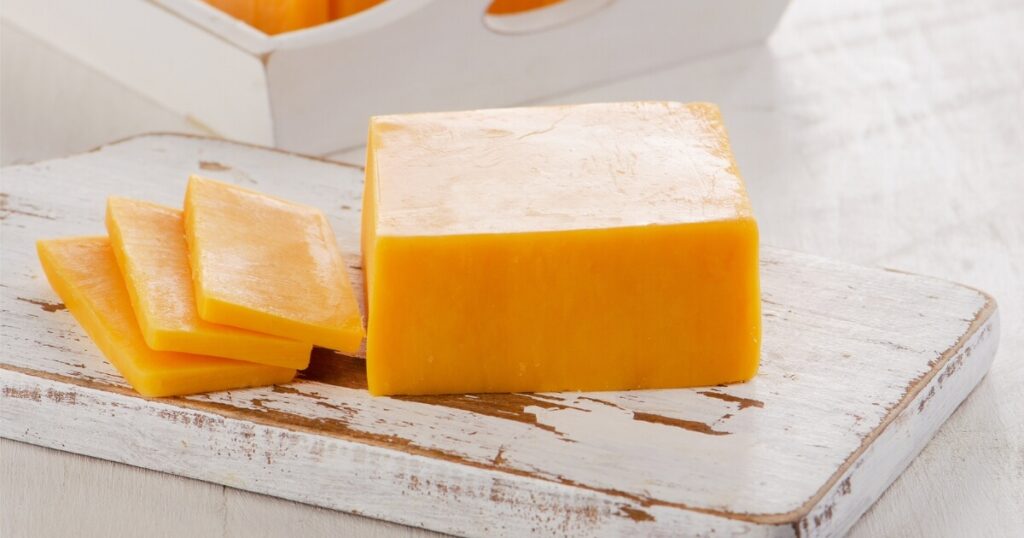
- Flavor Range: From mild to extra sharp, thanks to aging.
- Texture: Gets sharper and crumblier as it ages.
- Versatility: Great for burgers, sandwiches, and mac ‘n’ cheese.
- Pairs With: Apples for a crisp contrast, dark chocolate for a sweet surprise, and red wines like Cabernet or Merlot to complement its sharpness.
- Storage: Wrap in wax paper, then a resealable bag, and store in the fridge.
- Shelf Life: Good for a few weeks, but it’s so tasty it might not last that long.
- Color: White and orange versions are the same; the color comes from annatto dye.
Did you know that white and orange Cheddar are essentially the same? The orange hue comes from annatto, a natural food coloring. Some folks swear by one over the other, but it’s all about personal preference.
Mozzarella
Mozzarella cheese is the star of the pizza world, giving you that perfect, stretchy pull with each bite. But it’s not just for pizza. It’s also a key player in dishes like Caprese salads and lasagna. Imagine biting into a gooey Mozzarella stick or experiencing the creamy layers in a homemade lasagna. Yep, Mozzarella can do it all.
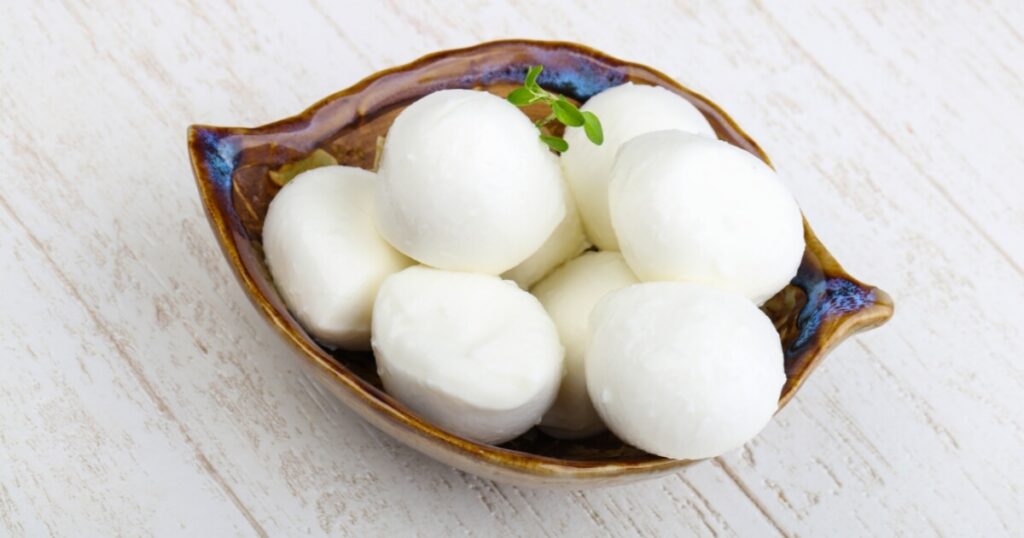
- Flavor Origin: Comes from Italy, made from cow’s milk or water buffalo milk for a richer taste.
- Versatility: Perfect for pizza, Caprese salads, Mozzarella sticks, and lasagna.
- Pairs With: Fresh tomatoes for a classic caprese, basil leaves for an herbal touch, and white wines like Pinot Grigio to keep things light and refreshing.
- Storage: For fresh, keep in brine in an airtight container; a resealable bag in the fridge works for shredded or block cheese.
- Shelf Life: Best used within a week for optimal melt and flavor.
- Melting Magic: High moisture content allows for dreamy, stretchy melts.
Did you know Mozzarella’s meltability is all about its high moisture content? That’s what gives you that dreamy, stretchy goodness when it’s heated.
Swiss
Swiss cheese is the star in a classic Reuben sandwich, where its nutty flavor pairs perfectly with tangy sauerkraut and rich corned beef. But it’s not just for sandwiches; it’s also a go-to for casseroles, quiches, and even fondue. Melted into a creamy blend or layered in a hearty dish, Swiss cheese adds that extra oomph.
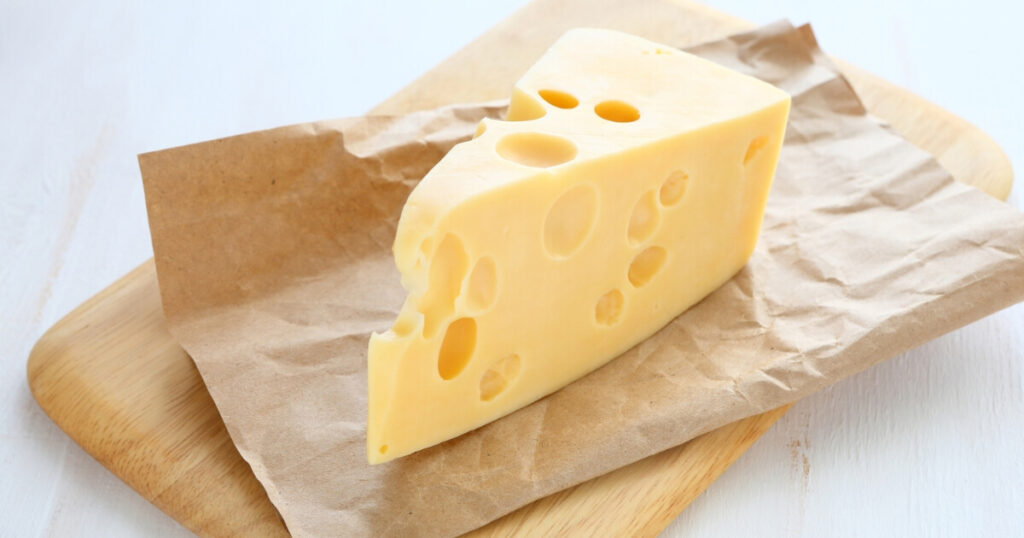
- Flavor Profile: Nutty and slightly sweet, intensifies with age.
- Versatility: Ideal for Reuben sandwiches, casseroles, quiches, and fondue.
- Pairs With: Fresh fruits like apples and pears, cured meats like ham, and beverages like a crisp lager or a light white wine such as Chardonnay.
- Storage: Wrap in plastic or wax paper, then store it in an airtight container or resealable bag in the fridge.
- Shelf Life: Lasts up to a month in the fridge. Flavor intensifies over time.
- Unique Feature: Iconic holes, or “eyes,” result from carbon dioxide bubbles during fermentation.
Did you know those iconic holes in Swiss cheese are actually from carbon dioxide bubbles formed during fermentation? The size of the holes can even clue you in on the cheese’s age and quality.
Parmesan
Parmesan cheese, officially known as Parmigiano-Reggiano, is the Italian king of hard cheeses that turns your pasta and risotto into something special. Aged for at least a year, its rich, nutty flavor is a game-changer in Italian dishes and beyond. Whether you’re grating it over pasta or folding it into a creamy risotto, Parmesan is the magic touch you’ve been looking for.
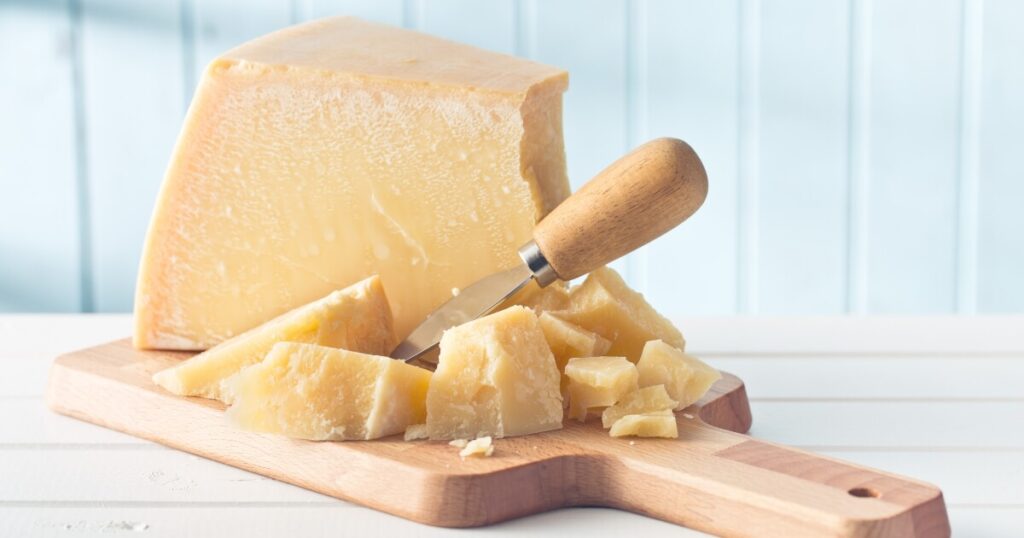
- Flavor Profile: Rich and nutty, intensifies with age.
- Versatility: Perfect for pasta, risotto, Caesar salads, and snacks.
- Pairs With: Fresh figs or grapes, honey, balsamic reduction, and beverages like a robust red wine or even a light beer for contrast.
- Storage: Wrap in parchment paper, then loosely in plastic wrap, and store in the fridge.
- Shelf Life: Can last for months in the fridge; if mold appears, just cut it off.
- Authenticity: Look for a stamped rind for genuine Parmigiano-Reggiano.
Did you know that real Parmigiano-Reggiano has a stamped rind as a mark of its quality and authenticity? So, if you’re in the market for the real deal, that’s your sign.
American
American cheese is the go-to for that perfect grilled cheese sandwich, melting into a creamy layer that’s pure comfort food. While it’s a cheese product rather than traditional cheese, its meltability is unbeatable. It’s the quick and easy choice for grilled cheese sandwiches, cheeseburgers, and even a creamy mac ‘n’ cheese or cheesy omelet.
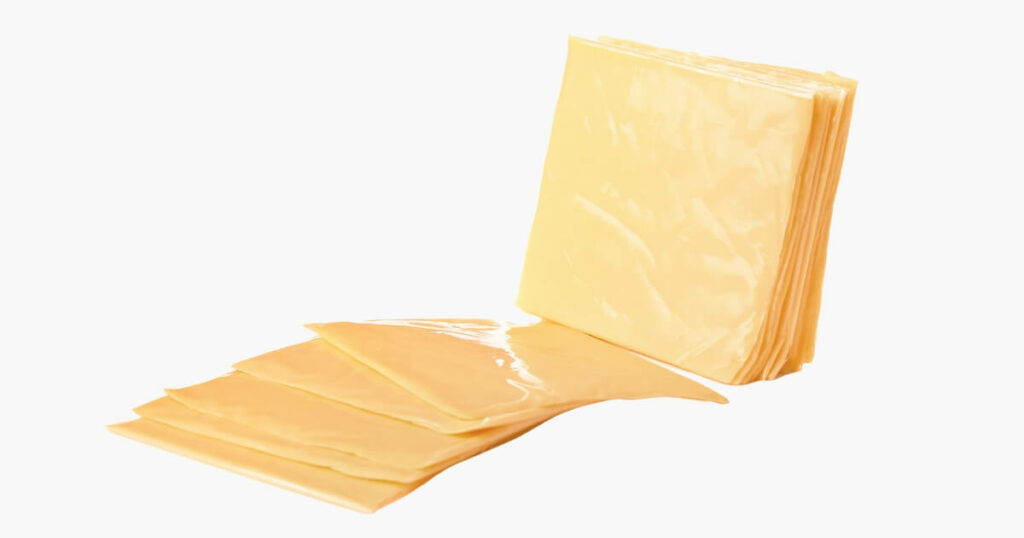
- Flavor Profile: Mild and creamy, designed for meltability.
- Versatility: Ideal for grilled cheese, cheeseburgers, mac ‘n’ cheese, and omelets.
- Pairs With: Pickles, tomatoes, bacon, most sandwiches.
- Storage: Keep in original packaging and store in the fridge.
- Shelf Life: Longer than most cheeses due to preservatives, but best within a couple of weeks.
- Origin: Initially made in Switzerland, but popularized in America.
Did you know American cheese was actually first made in Switzerland? It was designed for a longer shelf life and mass production, making it a staple during World War II.
Provolone
Provolone cheese is the Italian star that elevates your Italian subs with its smooth texture and mild, smoky flavor. Originating in Southern Italy and made from cow’s milk, this cheese is a close cousin to Mozzarella but packs a fuller flavor due to aging. Whether you’re layering it in an Italian sub or melting it over a Philly cheesesteak, Provolone is the versatile choice that never disappoints.
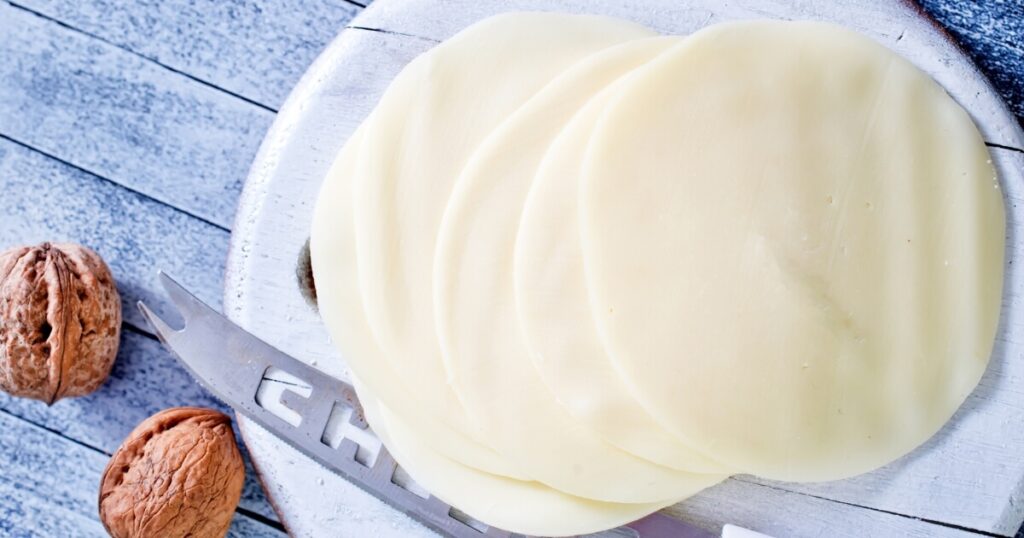
- Flavor Profile: Mild and smoky, with sharper options available.
- Texture: Smooth, melts well for a gooey finish.
- Versatility: Ideal for Italian subs, Philly cheesesteaks, and pizzas.
- Pairs With: Salami, turkey, olives, and beverages like Italian red wines or a crisp lager.
- Shelf Life: Good for a few weeks in the fridge; freezable for longer storage.
- Varieties: Comes in mild (Provolone Dolce) and sharp (Provolone Piccante) options.
Did you know Provolone comes in two main varieties? Provolone Dolce is the milder option, while Provolone Piccante is aged longer for a sharper, more intense flavor.
Monterey Jack
Monterey Jack cheese is the easygoing Californian that melts like a dream, making it a top pick for Tex-Mex dishes like quesadillas and nachos. Originating in the U.S., this white, semi-hard cheese is mellow and mild, perfect for when you want a cheese that complements rather than dominates.
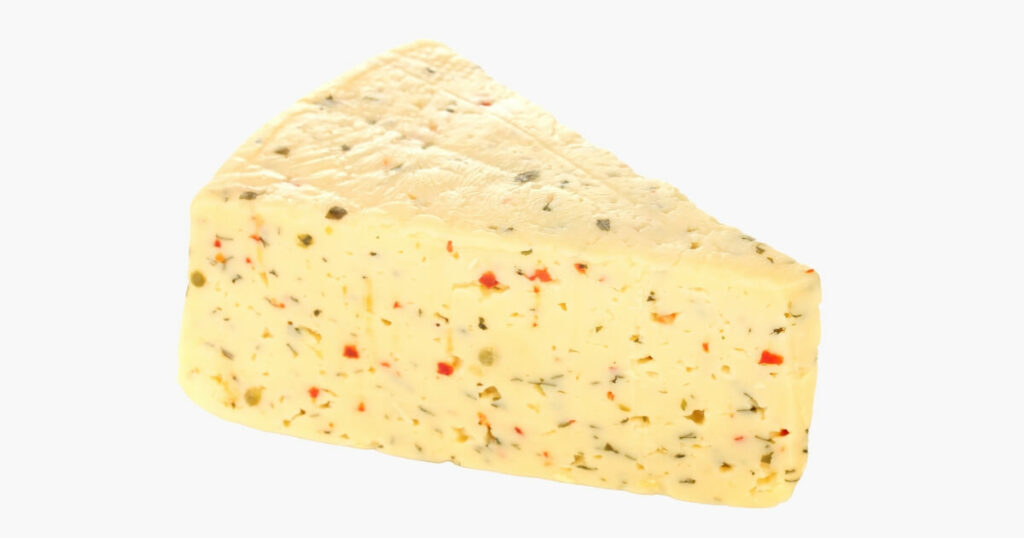
- Flavor Profile: Mellow and mild, ideal for blending with other flavors.
- Texture: Semi-hard but melts exceptionally well.
- Versatility: A star in Tex-Mex but also great in grilled cheese and pasta bakes.
- Pairs With: Jalapeños, chicken, guacamole, and drinks like light beers or white wines.
- Shelf Life: Keeps well for a few weeks in the fridge.
- Variants: Often blended with Colby to make Colby-Jack or spiced up to create Pepper Jack.
Did you know Monterey Jack can be spiced up with peppers to make Pepper Jack or blended with Colby to create Colby-Jack? So, whether you’re planning a Tex-Mex feast or just need a team player cheese, Monterey Jack has your back.
Cream Cheese
Cream cheese is your spreadable delight, perfect for everything from morning bagels to decadent cheesecakes. It’s made from cow’s milk and cream, this American classic offers a smooth, creamy texture and a mild, slightly tangy flavor that’s incredibly versatile.
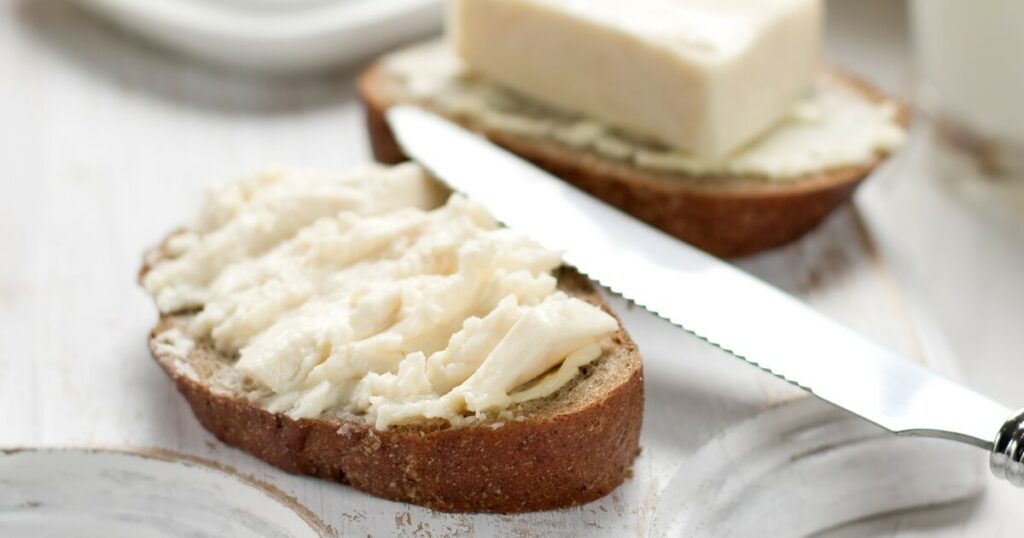
- Flavor Profile: Mild and slightly tangy, perfect for both savory and sweet dishes.
- Texture: Smooth and creamy, easily spreadable.
- Versatility: Ideal for bagels, dips, spreads, and desserts like cheesecake.
- Pairs With: Smoked salmon, fresh herbs, fruit preserves, and beverages like coffee or mimosas.
- Storage: Keep in original packaging and store in the fridge. Can be frozen.
- Shelf Life: Best used within two weeks of opening for peak creaminess.
Did you know cream cheese was first whipped up in the United States in the 19th century? It’s been a go-to ever since. So, whether you’re crafting a classic New York cheesecake or just spreading some love on a bagel, cream cheese is always a win.
Blue Cheese
Blue cheese is a bold and beautiful choice for those who crave intense flavor. With its striking blue veins and a taste that’s far from timid, this European classic comes in various styles like Gorgonzola and Roquefort. It’s the cheese that can turn a simple dish into a flavor-packed experience.

- Flavor Range: Strong and tangy, with a pungent kick that varies by different cheese types.
- Texture: Crumbly and moist, with blue veins of mold adding complexity.
- Versatility: Perfect for salads, sauces, and even as a standalone cheeseboard star.
- Pairs With: Figs, walnuts, honey, and strong beverages like stout or bourbon.
- Storage: Wrap in wax paper, place in an airtight container, and store in the fridge.
- Shelf Life: Lasts a few weeks, but store separately to prevent its strong aroma from affecting other cheeses.
- Origin: European roots with varieties like Gorgonzola from Italy and Roquefort from France.
Did you know those blue veins are actually a mold called Penicillium? It’s what gives blue cheese its unique look and unforgettable taste.
Gouda
Gouda is a crowd-pleaser from the Netherlands that’s as versatile as it is delicious. With a flavor profile ranging from rich buttery in its younger form to caramel-like when aged, it’s a cheese that can wear many hats. Whether you’re into the smoked version or prefer it plain, Gouda never disappoints.
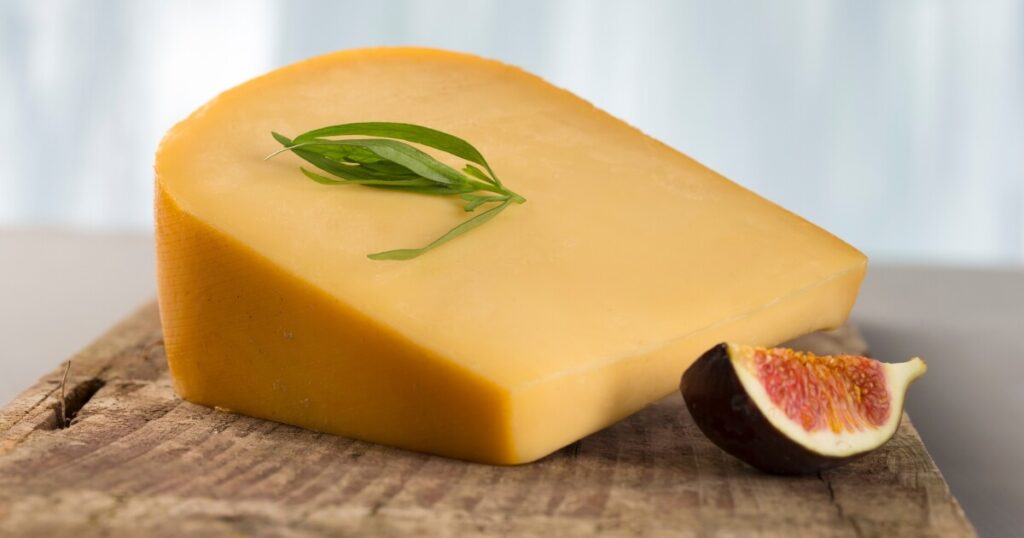
- Flavor Range: Young Gouda is mild and buttery, while aged Gouda has a caramel-like sweetness.
- Texture: Soft when young and becomes crumbly as it ages.
- Versatility: Charcuterie boards, grilled cheese, and creamy pasta dishes are ideal.
- Pairs With: Pears, almonds, light beers, and fruity white wines.
- Storage: Wrap in wax paper, followed by a resealable bag, and keep it in the fridge.
- Shelf Life: Stays tasty for a few weeks, and aged varieties can last even longer.
- Origin: Comes from the Netherlands and is a global favorite.
Did you know Gouda makes up more than half of the world’s cheese consumption? Yep, it’s that good.
Feta
Feta cheese is the Mediterranean darling that’s made its way into kitchens worldwide. Originating in Greece and primarily made from sheep’s milk, its tangy taste and salty notes make it a great addition to a variety of dishes. Just a sprinkle can elevate a meal from ordinary to extraordinary.
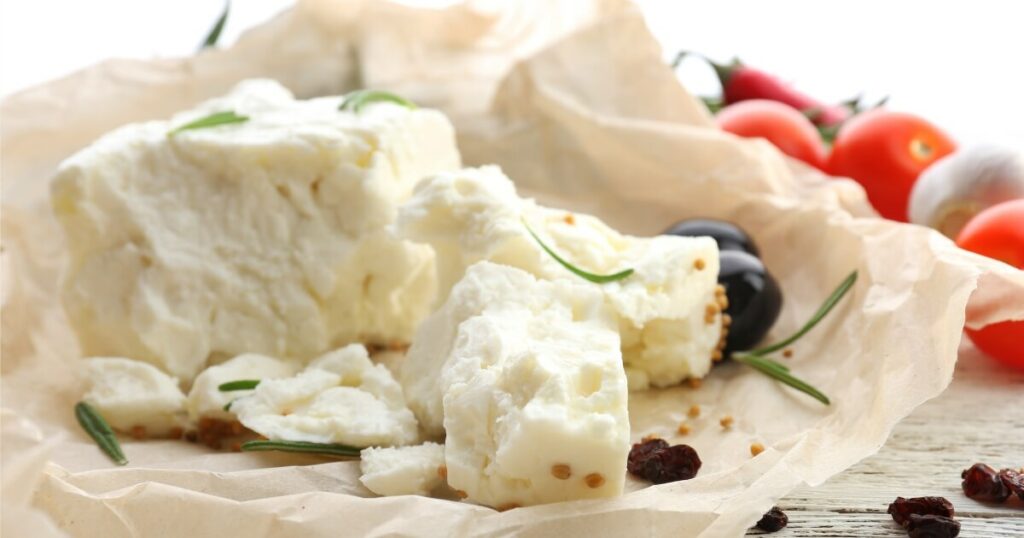
- Flavor Range: Tangy and salty flavor, with variations depending on whether it’s made from sheep’s or goat’s milk.
- Texture: Crumbly and easy to sprinkle over dishes.
- Versatility: Perfect for salads, Mediterranean dishes like spanakopita, and even watermelon salads.
- Pairs With: Olives, watermelon, cucumbers, and crisp white wines.
- Storage: Keep submerged in brine in an airtight container for optimal freshness.
- Shelf Life: Stays fresh for a couple of weeks when stored properly.
- Origin: Primarily from Greece but enjoyed worldwide.
Did you know that while most Feta is made from sheep’s milk, some varieties blend in goat’s milk for a unique flavor twist? So, whether you’re tossing together a Greek salad or stuffing a chicken breast, Feta is the cheese that adds that special zing.
Specialty Cheeses
Brie
Brie is a French cheese delicacy that’s a must-have for any cheese lover. Known as the “Queen of Cheeses,” its creamy center and edible rind offer a luxurious experience. Its flavor can be as varied as mild and buttery to rich and earthy, depending on how long it’s been aged.

- Flavor Range: Mild to earthy, influenced by its age and region of origin.
- Texture: Creamy interior with an edible, bloomy rind.
- Versatility: Ideal for appetizers, but also shines in sandwiches and even on pizza.
- Pairs With: Fresh berries, honey, baguette, and sparkling wines.
- Storage: Wrap in wax paper or parchment, then place in an airtight container in the fridge.
- Shelf Life: Best enjoyed within a week for peak flavor.
- Origin: Various regions in France, each with its own subtle flavor differences.
Camembert
Camembert is Brie’s more assertive relative, boasting a robust flavor that’s a hit with cheese lovers. Hailing from Normandy, France, it’s made from cow’s milk and shares Brie’s creamy center and edible rind. But don’t be fooled—Camembert packs a deeper, earthier punch, especially as it ages.

- Flavor Range: Earthy and intense, becoming more pronounced with age.
- Texture: Creamy with a bloomy, edible rind.
- Versatility: Excellent both hot and cold, from cheese boards to baked appetizers.
- Pairs With: Figs, walnuts, cured meats, and light-bodied white wines.
- Storage: Wrap in wax paper or parchment, secure in an airtight container, and refrigerate.
- Shelf Life: Best within a week to savor its full-bodied flavors.
- Packaging: Often comes in small, round wooden boxes that help maintain its shape and can be used for baking.
Did you know those charming wooden boxes Camembert comes in are more than just eye candy? They help keep the cheese’s shape and can even serve as a rustic baking dish.
Gruyère
Gruyère is the Swiss cheese that’s a melting marvel. With its nutty, slightly sweet notes, this cow’s milk cheese is a kitchen workhorse. Aged for several months, it has a firm but pliable texture that’s perfect for dishes requiring a good melt.
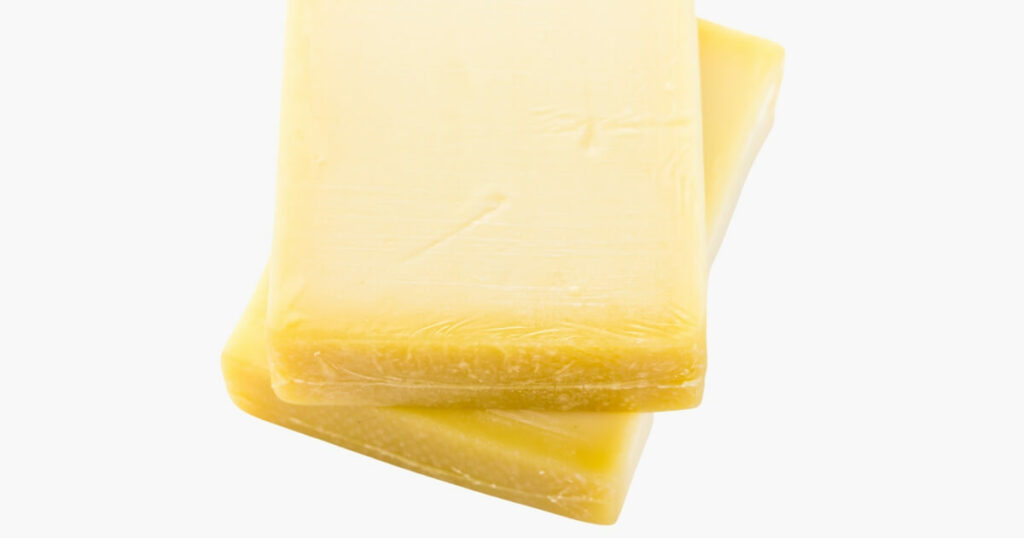
- Flavor Range: Nutty and slightly sweet, intensifying with age.
- Texture: Firm cheese yet pliable, ideal for melting.
- Versatility: A star in fondue and French onion soup, but also great in quiches and gratins.
- Pairs With: Crusty bread, cured meats, and full-bodied red wines.
- Storage: Wrap tightly in plastic wrap or wax paper, then place in a resealable bag in the fridge.
- Shelf Life: Can last several weeks, with flavors becoming more robust over time.
- Holes: Unlike some Swiss cheeses, Gruyère is hole-free, making it excellent for melting.
Did you know Gruyère doesn’t have holes, even though it’s a Swiss cheese? That smooth texture is what makes it a top pick for melting.
Havarti
Havarti is the Danish cheese that’s a hit for casual snacking or adding a creamy touch to your dishes. Made from cow’s milk, it’s a semi-soft cheese and sports a buttery flavor often enhanced with herbs or spices like dill.
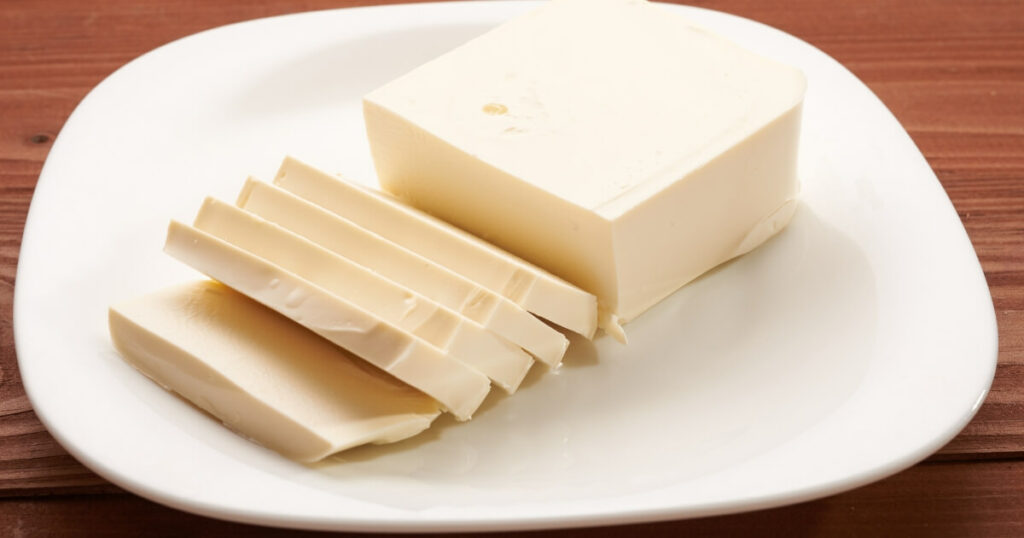
- Flavor Range: Mild and buttery, sometimes enhanced with herbs or spices.
- Texture: Creamy and semi-soft, perfect for snacking or melting.
- Versatility: Excellent for cheese plates, paninis, and even a twist on mac ‘n’ cheese.
- Pairs With: Fresh fruits like grapes and pears, light white wines, and crisp crackers.
- Storage: Wrap in wax paper or plastic wrap, then stash it in a resealable bag in the fridge.
- Shelf Life: Stays fresh for a couple of weeks in proper storage.
Did you know Havarti was first made at the Havartigaard estate in Denmark? It’s a cheese with a history as rich as its flavor.
Ricotta
Ricotta is the Italian soft cheese that’s a staple in dishes like lasagna and stuffed pasta. Made from whey, it’s light, fluffy, and mildly sweet, making it a versatile choice for both savory and sweet recipes.
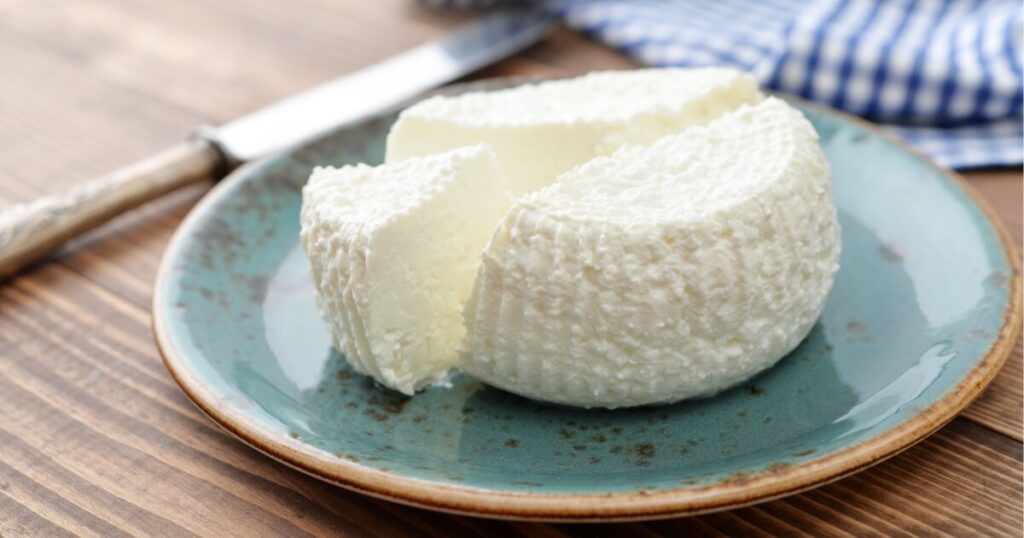
- Flavor Range: Mildly sweet and creamy, a subtle flavor that enhances dishes.
- Texture: Light and fluffy, ideal for mixing into recipes or spreading.
- Versatility: Perfect for lasagna, stuffed pasta, cheesecakes, and even pancakes.
- Pairs With: Fresh berries, honey, whole grain bread, and light white wines.
- Storage: Keep in the original container with a tight lid, stored in the fridge.
- Shelf Life: Best used within a week due to its high moisture content.
- Origin: The name “Ricotta” translates to “recooked” in Italian, nodding to its production process.
Did you know Ricotta means “recooked” in Italian? It’s a nod to how this cheese is made from reheated whey.
Goat Cheese
Goat cheese, or chèvre, is the tangy delight that hails from goats. Its bold, zesty flavor and crumbly texture make it a cheese that’s hard to ignore. Whether crafting a French-inspired dish or just wanting to jazz up a salad, goat cheese is your go-to.
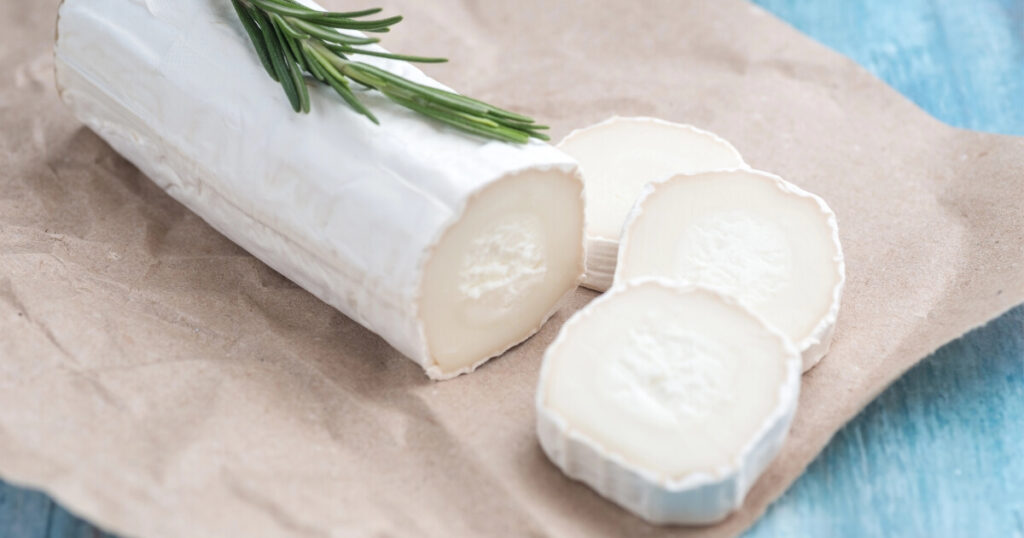
- Flavor Range: Bold and tangy, with a zest that livens up any dish.
- Texture: Crumbly and soft, easy to spread or crumble.
- Versatility: Ideal for salads, spreads, scrambled eggs, and even pizza toppings.
- Pairs With: Honey, figs, walnuts, and crisp white wines.
- Storage: Keep goat cheese in an airtight container in the fridge. If it comes with herbs or leaves, leave those on for added flavor.
- Shelf Life: Best when used within one to two weeks.
- Digestibility: Easier on the stomach than cow’s milk cheese, a plus for the lactose-sensitive.
Did you know that goat cheese is easier to digest than cow’s milk cheese? Yep, it’s a solid choice if you’re lactose-sensitive.
Asiago
Asiago is your Italian go-to when you’re craving cheese with a nutty, robust kick. Originating from the Veneto region, this cow’s milk cheese is a culinary chameleon. Its texture and flavor can vary from smooth and buttery to crumbly and sharp, depending on how long it’s aged.
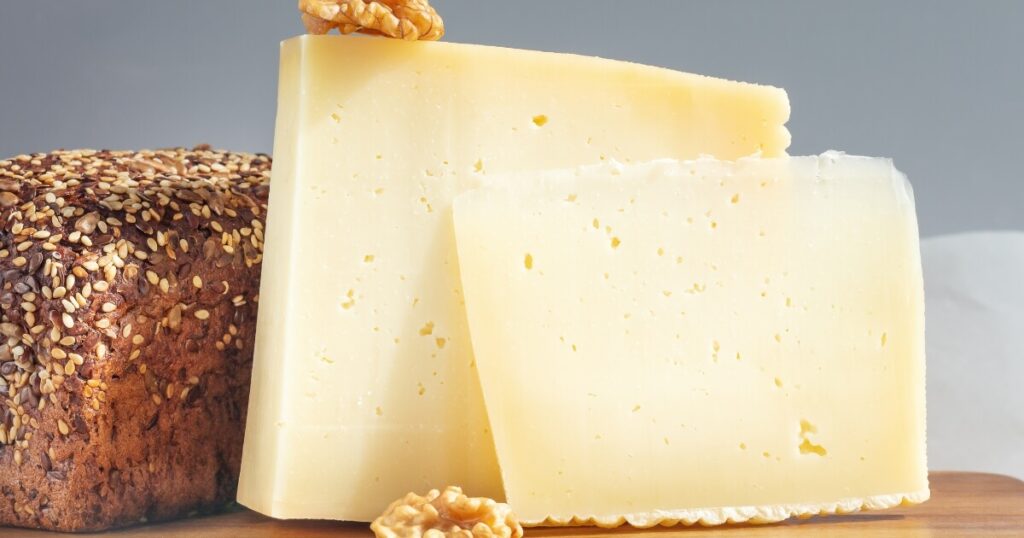
- Flavor Range: Nutty and robust, varying from mild to sharp based on aging.
- Texture: Can be smooth and buttery or crumbly and sharp.
- Versatility: Perfect for grating over soups and pasta or enjoying on a cheese board.
- Pairs With: Pears, prosciutto, crusty bread, and Italian red wines.
- Storage: Wrap it up in wax paper, slide it into a resealable bag, and pop it in the fridge.
- Shelf Life: Can last several weeks, and the flavor gets even better as it ages.
- Origin: Hails from the Veneto region of Italy.
Did you know Asiago is ancient? We’re talking a thousand years old. So, the next time you’re looking for a cheese that’s stood the test of time and can elevate your dishes, grab some Asiago.
Fontina
Fontina is the Italian cheese that’s got melting down to an art. Hailing from the Aosta Valley, this cow’s milk cheese is a smooth operator with a mild, nutty flavor and earthy undertones. It’s a multitasker in the kitchen, perfect for anything that calls for a good melt.
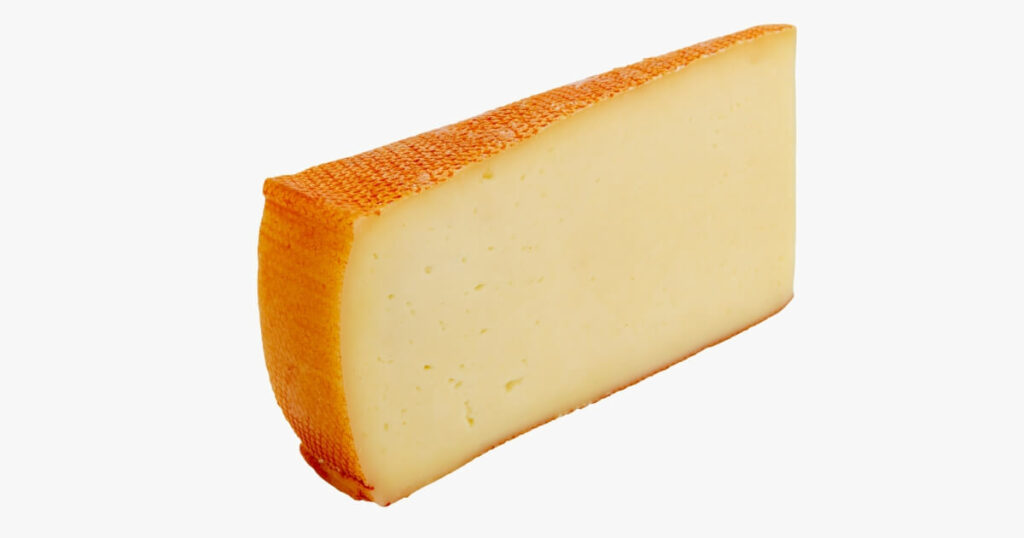
- Flavor Range: Mild and nutty with earthy notes.
- Texture: Smooth and semi-soft, turns gooey when melted.
- Versatility: Ideal for paninis, quiches, frittatas, and baked dishes like gratins.
- Pairs With: Sliced apples, crusty bread, cured meats like prosciutto, and a glass of Chardonnay.
- Storage: First, wrap it in wax paper, then stash it in a resealable bag, and into the fridge it goes.
- Shelf Life: Keeps its charm for a few weeks in proper storage.
- Origin: Comes from the Aosta Valley in Italy.
Ever heard of the “Fiera di Sant’Orso”? It’s a festival in Italy where Fontina is the guest of honor. Artisans and cheese makers gather to celebrate this melt-in-your-mouth marvel.
Roquefort
Roquefort is the French blue cheese that packs a punch. Made from sheep’s milk and aged in the natural caves of Roquefort-sur-Soulzon, it’s a crumbly, tangy powerhouse. If you’re looking to elevate a dish or a cheese board, Roquefort is your go-to.
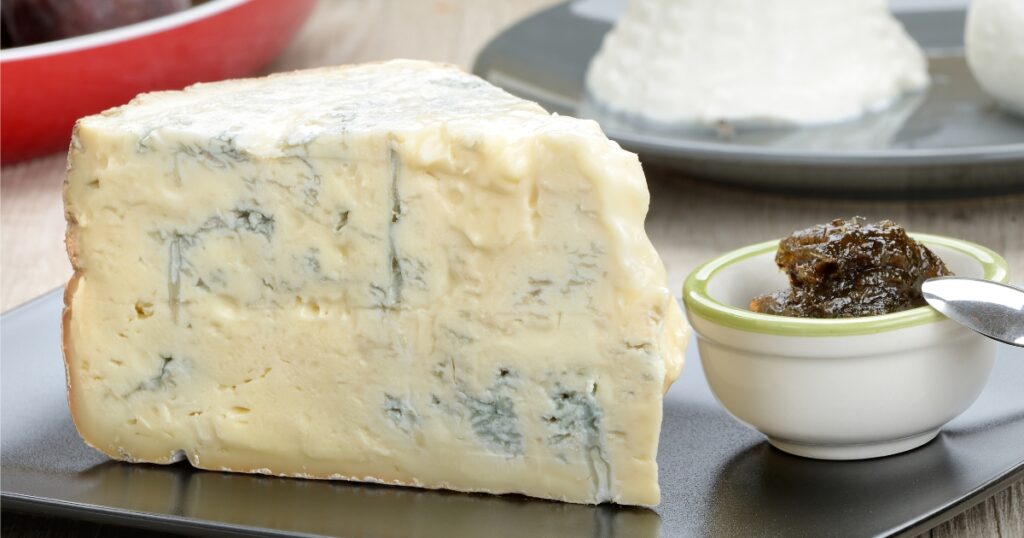
- Flavor Range: Strong and tangy, a real attention-grabber.
- Texture: Crumbly and a bit moist, thanks to cave aging.
- Versatility: Perfect for bold salad dressings, cheese boards, and even crumbled over steaks.
- Pairs With: Fresh pears, walnuts, a drizzle of honey, and a glass of robust red wine.
- Storage: Wrap it up in foil, pop it in an airtight container, and into the fridge it goes.
- Shelf Life: It can last a few weeks, but its strong flavor might make it disappear faster.
- Origin: Aged in the natural caves of Roquefort-sur-Soulzon, France.
Did you know Roquefort is often called the “King of Cheeses”? It’s got history, too, with records dating back to 79 AD.
Stilton
Stilton is the British blue cheese that’s a royal treat for your taste buds. Made from cow’s milk, it’s got that Protected Designation of Origin, so you know it’s the real deal. With its creamy texture and nutty complex flavor, Stilton is more than just a cheese—it’s an experience.

- Flavor Range: Rich and nutty, with a complexity that keeps you coming back for more.
- Texture: Creamy and crumbly, a delightful contrast.
- Versatility: A star on cheese boards, but also great in sauces and paired with fruits.
- Pairs With: Port wine, full-bodied reds, pears, and figs.
- Storage: Wrap in wax paper, place in an airtight container, and chill in the fridge.
- Shelf Life: Lasts several weeks, and some say it gets even better with age.
- Origin: Only true Stilton comes from specific counties in England.
Stilton is often called the “English King of Cheeses!” It’s a holiday favorite, too, making appearances at Christmas and New Year’s celebrations.
Gourmet Picks
Manchego
Manchego is the Spanish sensation that comes straight from the La Mancha region. Made from the milk of Manchega sheep, this cheese is a fiesta of flavors, ranging from nutty to tangy. Whether it’s mild and creamy or crumbly and intense, Manchego is always a hit.
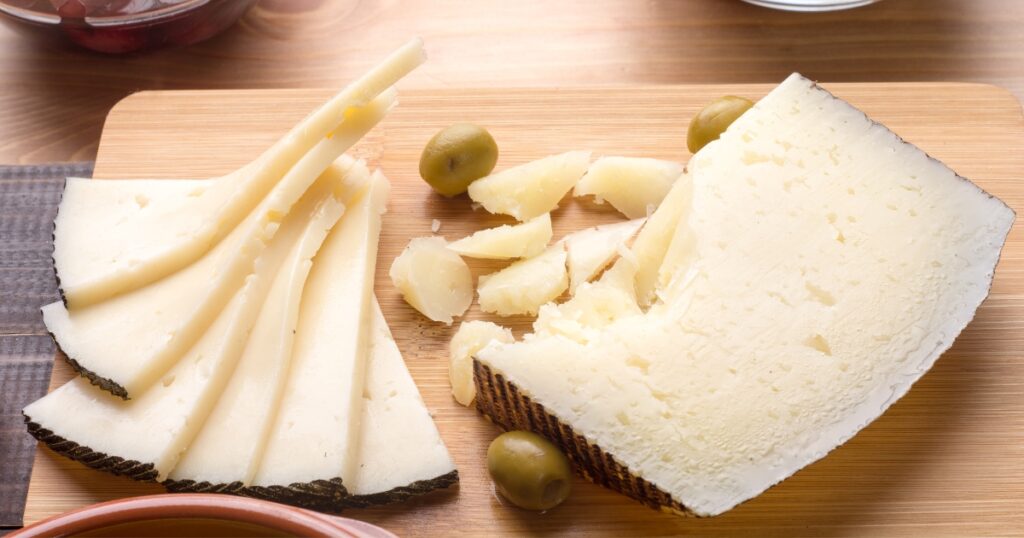
- Flavor Range: Nutty with a hint of tanginess, varies with age.
- Texture: From firm and crumbly to smooth and creamy, depending on how long it’s been aged.
- Versatility: Perfect for tapas, salads, and grilled veggies.
- Pairs With: Serrano ham, quince paste, and olives.
- Storage: Wrap it in wax paper, pop it into a resealable bag, and put it into the fridge.
- Shelf Life: Keeps its zing for several weeks, especially if it’s well-aged.
- Origin: Authentic Manchego comes only from the La Mancha region of Spain.
Did you know Manchego is the star of a Spanish dessert called “Tarta de Queso Manchego”? It’s a cheesecake that’s got the whole country talking.
Taleggio
Taleggio is an Italian cheese from the Lombardy region and is a bit of a paradox. It’s got a strong, almost stinky aroma, but don’t let that fool you. Once you take a bite, you’re met with a mild, fruity flavor that’s downright addictive. Its creamy, slightly sticky texture is just the cherry on top.
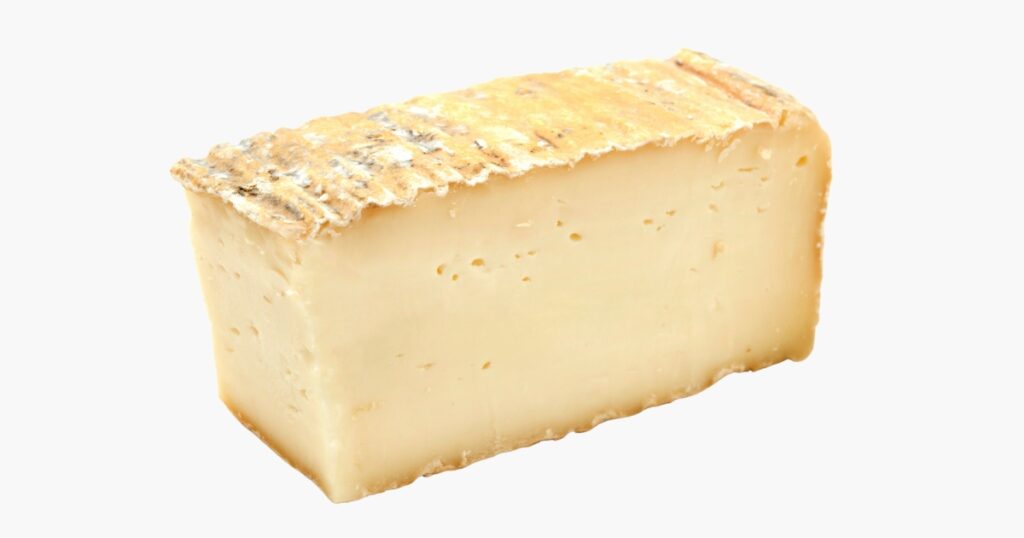
- Flavor Range: Mild and fruity, a pleasant surprise given its strong aroma.
- Texture: Creamy and a tad sticky, but in the best way possible.
- Versatility: Melts like a dream, so think risotto or polenta dishes.
- Pairs With: Sweet fruits like grapes or figs to balance out that robust scent.
- Storage: Wrap it in parchment paper, stash it in an airtight container, and keep it in the fridge.
- Shelf Life: Best enjoyed within a week or two so you capture that creamy goodness.
- Origin: Straight from Italy’s Lombardy region, and it’s been around since the 9th century!
Did you know Taleggio is one of the oldest soft cheeses out there? Farmers used to make it in the fall and let it age in caves all winter long. So, if you’re looking to step out of your cheese comfort zone, Taleggio is your ticket to something extraordinary.
Pecorino Romano
Meet Pecorino Romano, Italy’s answer to an ancient and incredibly flavorful cheese. This sheep’s milk cheese is salty, tangy, and hard as a rock—in a good way! It’s perfect for grating over dishes where you want a burst of umami goodness. Plus, it’s got a history that dates back to the Roman Empire. How’s that for a conversation starter?
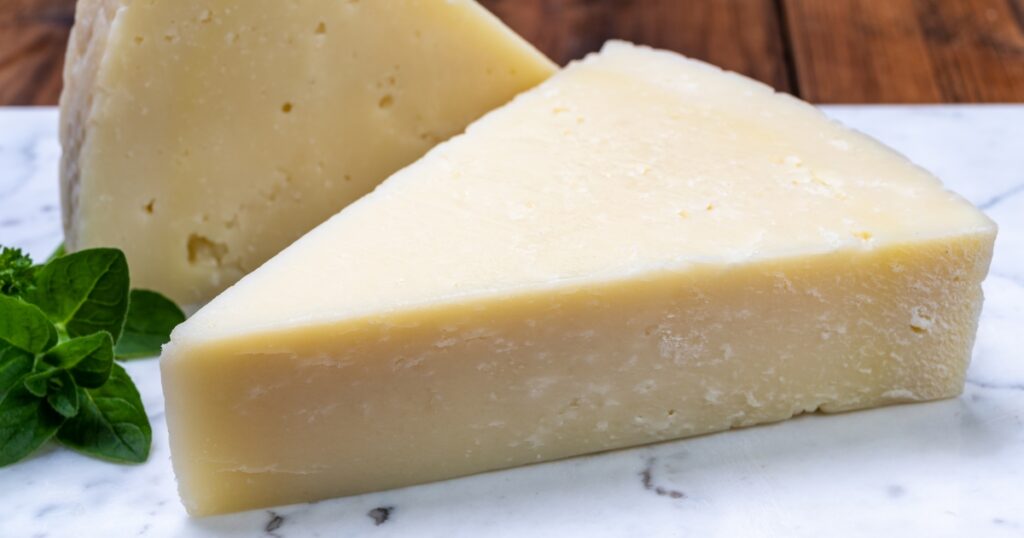
- Flavor Range: Robust and tangy, with an unmistakable salty kick.
- Texture: Hard and crumbly, making it your go-to for grating.
- Versatility: Ideal for pasta dishes, salads, and cheese boards.
- Pairs With: Bold flavors like olives, cured meats, and even some fruits.
- Storage: Wrap it up in wax paper, slide it into a resealable bag, and off to the fridge it goes.
- Shelf Life: Its hard texture and high salt content can last for months.
- Origin: All the way from Italy, and it’s been around since Roman times.
Did you know that Roman soldiers used to carry Pecorino Romano on their journeys? Its long shelf life and high protein content made it a practical choice for those long treks.
Limburger
This cheese has a reputation that precedes it, mostly because of its, let’s say, distinctive aroma. But don’t let that scare you off. Originating from Belgium and Germany, this cow’s milk cheese is actually quite mild and buttery in flavor. It’s got a soft, spreadable texture that only gets creamier as it ages.
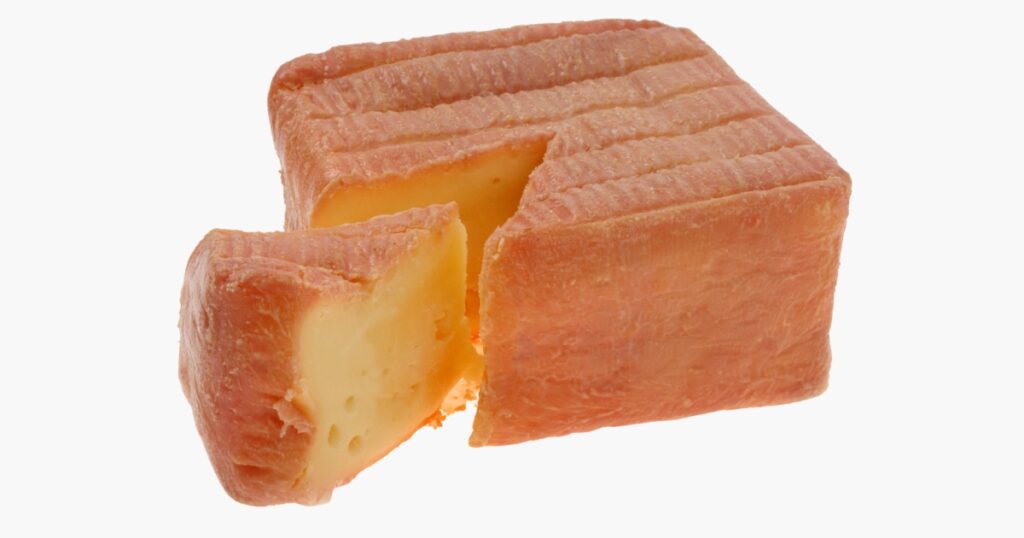
- Flavor Range: Mild buttery, completely contrasting to its strong smell.
- Texture: Soft and spreadable, becoming even creamier over time.
- Versatility: Perfect for bold sandwiches or melted into a sauce.
- Pairs With: Rye bread and onions, or even in a unique mac ‘n’ cheese.
- Storage: Double-wrap in parchment paper and store in an airtight container in the fridge.
- Shelf Life: Keeps well for a few weeks, but its strong aroma might make you think it’s older than it is.
- Origin: A Belgian-German collaboration that’s been turning heads and wrinkling noses.
Did you know that the bacteria used to ripen Limburger is the same one responsible for human body odor? Yep, that’s the secret behind its infamous smell. But once you get past that, you’ll find a cheese that’s rich in flavor and surprisingly versatile.
Jarlsberg
Meet Jarlsberg, Norway’s answer to those Swiss cheese cravings. This cow’s milk cheese has a holey look and buttery texture. It’s got a mild, nutty flavor that’s a hit whether you’re snacking or cooking.
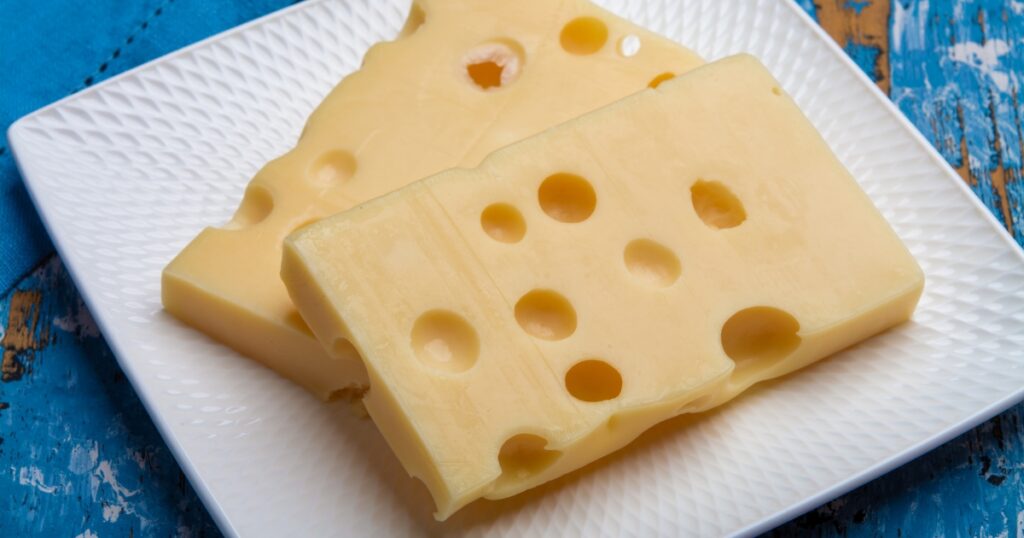
- Flavor Range: Mild and nutty with a hint of sweetness.
- Texture: Buttery and smooth, with those signature holes.
- Versatility: Excellent for melting, making it a top pick for quiches and grilled cheese.
- Pairs With: Apples, grapes, and even a light white wine.
- Storage: Wrap in wax paper, pop it into a resealable bag, and go into the fridge.
- Shelf Life: Lasts for several weeks, and some say it gets even better as it ages.
Jarlsberg is the brainchild of Norwegian scientists from the 1950s. They combined traditional cheesemaking with microbiology to create this modern classic.
Queso Fresco
Queso Fresco is like the best friend you invite to every party—always a hit and never steals the spotlight. This Mexican fresh cheese is usually made from cow’s milk or a cow and goat milk blend. It’s soft, crumbly, and just a bit salty, making it perfect for crumbling over all sorts of dishes.
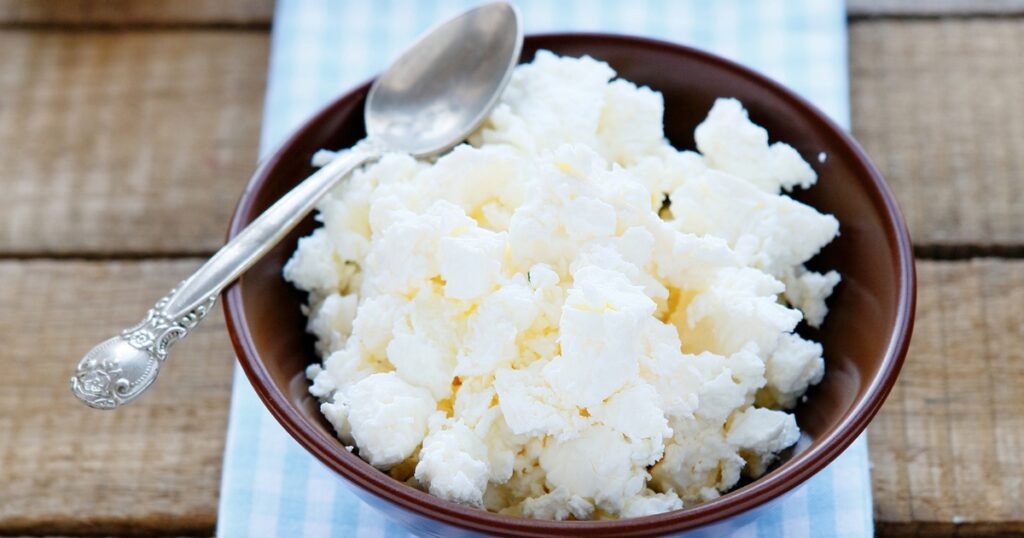
- Flavor Range: Mild with a hint of saltiness.
- Texture: Soft and crumbly, ideal for sprinkling.
- Versatility: A must for tacos, chili, and guacamole.
- Pairs With: Spicy foods, it’s the yin to their yang.
- Shelf Life: Best within a week or two, it’s a fresh cheese, after all.
- Origin: A staple in Mexican cuisine, its name literally means “fresh cheese” in Spanish.
Did you know that Queso Fresco is probably the most popular cheeses in Mexican cuisine? And for good reason. Its mild flavor and crumbly texture make it the perfect sidekick to spicier foods, balancing out the heat without taking center stage.
Halloumi
Halloumi is the cheese that loves the grill as much as you do. Hailing from Cyprus, this semi-hard, brined cheese is a blend of goat’s, sheep’s, and sometimes cow’s milk. But here’s the kicker: it has a high melting point. That means you can grill or fry it to a crispy, golden perfection without it turning into a gooey mess.

- Flavor Range: Salty and slightly tangy, gets a smoky note when grilled.
- Texture: Semi-hard but turns crispy when cooked and remains soft inside.
- Versatility: Perfect for grilling, frying, and even as a meat substitute.
- Pairs With: Watermelon, fresh herbs, and a cold glass of white wine.
- Storage: Keep it in its brine, sealed in an airtight container in the fridge.
- Shelf Life: Can last several weeks, thanks to its brine.
- Cooking Tip: Slice it thick and grill until golden brown for the best experience.
Did you know that in Cyprus, they often pair Halloumi with watermelon? The refreshing sweetness of the fruit perfectly balances the cheese’s saltiness.
Mascarpone
Mascarpone is like the cashmere of the cheese world—smooth, luxurious, and oh-so-creamy. This Italian soft cheese, made from cow’s milk, is the secret behind some of Italy’s most cherished desserts, especially tiramisu. But don’t pigeonhole it as just a dessert cheese; its rich, velvety texture can elevate savory dishes to new heights.
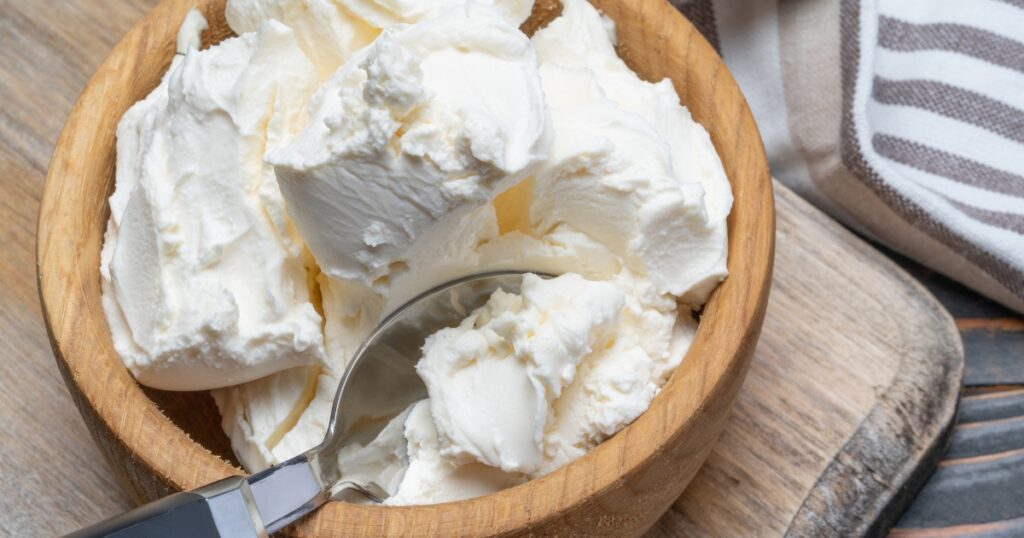
- Flavor Range: Mild and sweet, almost like a less tangy cream cheese.
- Texture: Creamy and velvety, easily spreadable.
- Versatility: A star in desserts like tiramisu, but also shines in risottos and pasta sauces.
- Pairs With: Coffee, chocolate, and fruits like strawberries.
- Storage: Keep it in an airtight container in the fridge.
- Shelf Life: Best within a week to savor its peak creaminess.
- Origin: Hails from the Lombardy region of Italy.
Did you know that Mascarpone is often made with a dash of acidity, like lemon juice, to help thicken the cream? So, whether you’re whipping up a classic tiramisu or stirring it into a creamy risotto, Mascarpone is your go-to for adding a touch of elegance.
Comté
Comté is France’s gift to cheese lovers. This cow’s milk cheese from the Jura region is a bit of a chameleon. Its flavor can swing from sweet and fruity to earthy and savory, depending on how long it’s aged. With its firm texture, it’s not just for nibbling; it’s a culinary multitasker.
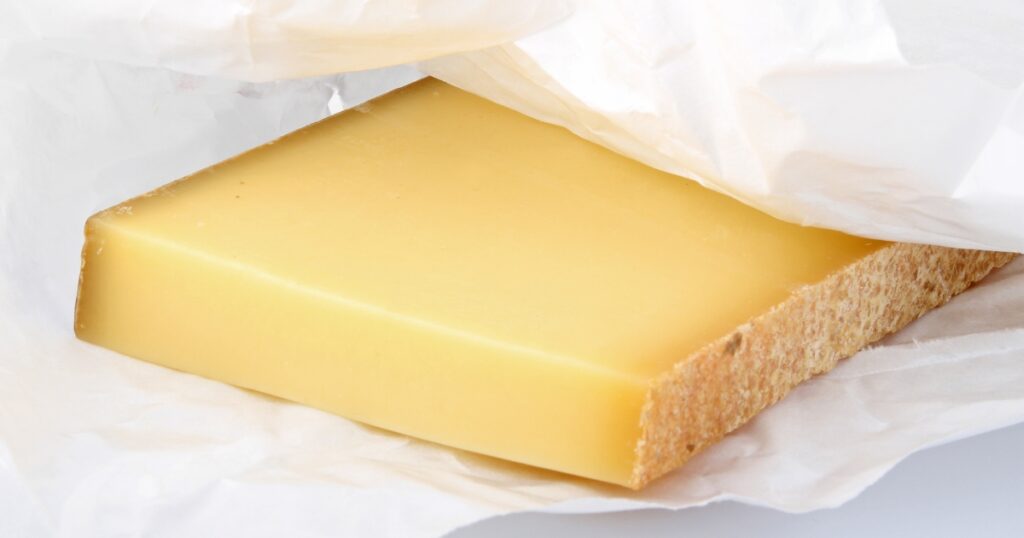
- Flavor Range: Nutty and complex, depending on age, varies from sweet and fruity to earthy.
- Texture: Firm cheese, yet smooth.
- Versatility: Perfect in quiches, croque-monsieur, potato gratins, and creamy sauces.
- Pairs With: Apples, grapes, and crusty French bread.
- Storage: Wrap in wax paper, followed by a resealable bag, and into the fridge it goes.
- Shelf Life: Can last several weeks, getting better with age.
- Grading: The unique system scores each wheel out of 20 for texture, flavor, and appearance.
Did you know that Comté has its own grading system? Wheels have to score at least 15 out of 20 to even be called Comté.
Aged Gouda
Meet Aged Gouda, the cheese that’s like a fine wine—better with age. This Dutch delight develops caramel notes as it matures, adding a layer of sweetness to its already nutty, robust flavor. Its crumbly texture is a joy, whether you’re slicing it for a snack or melting it into a dish.

- Flavor Range: Nutty and robust with caramel undertones, thanks to aging.
- Texture: Crumbly and rich.
- Versatility: A star on cheese boards, also great grated over veggies or melted into pasta sauces.
- Pairs With: Dark chocolate, full-bodied red wines, and crusty bread.
- Storage: Wax paper first, then a resealable bag, and off to the fridge.
- Shelf Life: Can last several months, aging like a champ.
- Aging Process: Can range from a few months to several years, intensifying flavors over time.
Did you know the aging process for Gouda can be as short as a few months or stretch out for years? The longer it ages, the more those caramel and nutty notes emerge, but don’t try aging it yourself.





